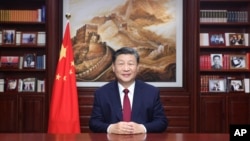Chinese President Xi Jinping said in a New Year’s address that China would “surely be reunified” with the self-ruled territory of Taiwan, renewing Beijing’s threat to militarily take over the island but setting no timetable for gaining control.
Xi’s remarks came just ahead of Taiwan’s January 13 presidential and parliamentary elections that China has described as a choice between war and peace.
William Lai, who currently serves as vice president from the ruling Democratic People's Party, is the presidential front-runner, but China considers him a "separatist" and has accused him and Taiwan's President Tsai Ing-wen of trying to provoke a Chinese attack on the island.
Taiwan split from China amid civil war in 1949, but Beijing continues to regard the island as Chinese territory and has long coveted Taiwan’s technology-heavy economy even as the island governs itself. China has regularly sent fighter jets on flights in airspace close to the island and warships near Taiwanese waters.
Under its “one-China” policy, the United States recognizes that China claims Taiwan as its own but has continued to ship weapons to Taiwan. The U.S. describes its policy as “strategic ambiguity,” although President Joe Biden has periodically said the U.S. would defend Taiwan in the event of a Chinese attack. White House officials later have said there is no change in U.S. policy.
Xi’s New Year’s remarks were open to interpretation as to Beijing’s intentions.
"China will surely be reunified, and all Chinese on both sides of the Taiwan Strait should be bound by a common sense of purpose," Xi said in his annual address, according to the official Xinhua News Agency.
On Saturday, Chen Binhua, spokesperson for China's Taiwan Affairs Office, called Lai a "destroyer of peace" following a televised debate earlier that day in which Lai defended Taiwan's right to rule itself as a democracy.
Chen said Lai's remarks at the debate were "full of confrontational thinking," adding that the vice president is "the instigator of a potential dangerous war in the Taiwan Strait."
Lai had said during the debate that Taiwan is not subordinate to China and that he was open to talks with Beijing "as long as there is equality and dignity on both sides of the Taiwan Strait."
Lai does not describe himself as seeking independence from Beijing because he already considers Taiwan an independent country.
Lai's election rivals include Hou Yu-ih from the China-friendly Kuomintang party, and Ko Wen-je from the Taiwan People's Party.
Some material in this report came from The Associated Press.




